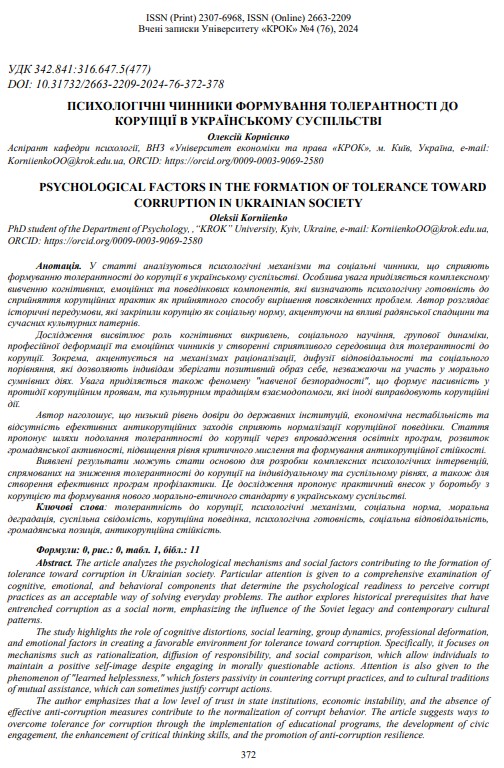PSYCHOLOGICAL FACTORS IN THE FORMATION OF TOLERANCE TOWARD CORRUPTION IN UKRAINIAN SOCIETY
DOI:
https://doi.org/10.31732/2663-2209-2024-76-372-378Keywords:
tolerance toward corruption, psychological mechanisms, social norm, moral degradation, public consciousness, corrupt behavior, psychological readiness, social responsibility, civic stance, anti-corruption resilienceAbstract
The article analyzes the psychological mechanisms and social factors contributing to the formation of tolerance toward corruption in Ukrainian society. Particular attention is given to a comprehensive examination of cognitive, emotional, and behavioral components that determine the psychological readiness to perceive corrupt practices as an acceptable way of solving everyday problems. The author explores historical prerequisites that have entrenched corruption as a social norm, emphasizing the influence of the Soviet legacy and contemporary cultural patterns.
The study highlights the role of cognitive distortions, social learning, group dynamics, professional deformation, and emotional factors in creating a favorable environment for tolerance toward corruption. Specifically, it focuses on mechanisms such as rationalization, diffusion of responsibility, and social comparison, which allow individuals to maintain a positive self-image despite engaging in morally questionable actions. Attention is also given to the phenomenon of "learned helplessness," which fosters passivity in countering corrupt practices, and to cultural traditions of mutual assistance, which can sometimes justify corrupt actions.
The author emphasizes that a low level of trust in state institutions, economic instability, and the absence of effective anti-corruption measures contribute to the normalization of corrupt behavior. The article suggests ways to overcome tolerance for corruption through the implementation of educational programs, the development of civic engagement, the enhancement of critical thinking skills, and the promotion of anti-corruption resilience.
The findings could serve as a basis for developing comprehensive psychological interventions aimed at reducing tolerance for corruption at both individual and societal levels, as well as for creating effective prevention programs. This research offers a practical contribution to combating corruption and establishing new moral and ethical standards in Ukrainian society.
Downloads
References
Бохотькова, Ю., Цимбал, С., Яременко, Н., & Бугайова, Н. (2023). Дослідження типів навченої безпорадності майбутніх фахівців іноземної філології. Insight: The Psychological Dimensions of Society, 10, 213–231.
Ковандра, А. В., & Овчаренко, Л. В. (2022). Корупція в Україні: історія та сучасність. Редакційна колегія, 335.
Лозинський, О. М. (2020). Психологія корупції та інтолерантного ставлення громадян до неї (4-те вид.). Львів: Видавничий центр ЛНУ ім. Івана Франка.
Лозинський, О. М. (2021). Психологічні чинники інтолерантного ставлення громадян до корупції (Кваліфікаційна наукова праця на правах рукопису).
Модель, Т. М. (2020). Вплив групових норм на формування корупційної поведінки. Редакційна колегія, 160.
Недря, К. М. (2020). Психологія корупції: гра без правил.
Петрунько, О. В. (2014). Успадкований і набутий досвід інтолерантності. Психологічні науки: Проблеми і здобутки, 6, 145–155.
Сандалова, О. О. (2020). Дифузія відповідальності. Дорогі друзі!, 560.
Тодорова, І. (2019). Психологічні чинники толерантності студентів до академічної недоброчесності. Психологія і особистість, 2, 116–131.
Федосова, Л. О., & Хлопчур, Є. О. (2022). Професійна деформація та вигорання. Science and Technology: Problems, Prospects and Innovations: The 1st International Scientific and Practical Conference, October 19–21, 2022. Osaka: CPN Publishing Group, 222.
Шумовецька, С. (2021). Потенціал гуманітарних дисциплін і формування нульової толерантності до корупції.

Downloads
Published
How to Cite
Issue
Section
License

This work is licensed under a Creative Commons Attribution-NonCommercial 4.0 International License.

